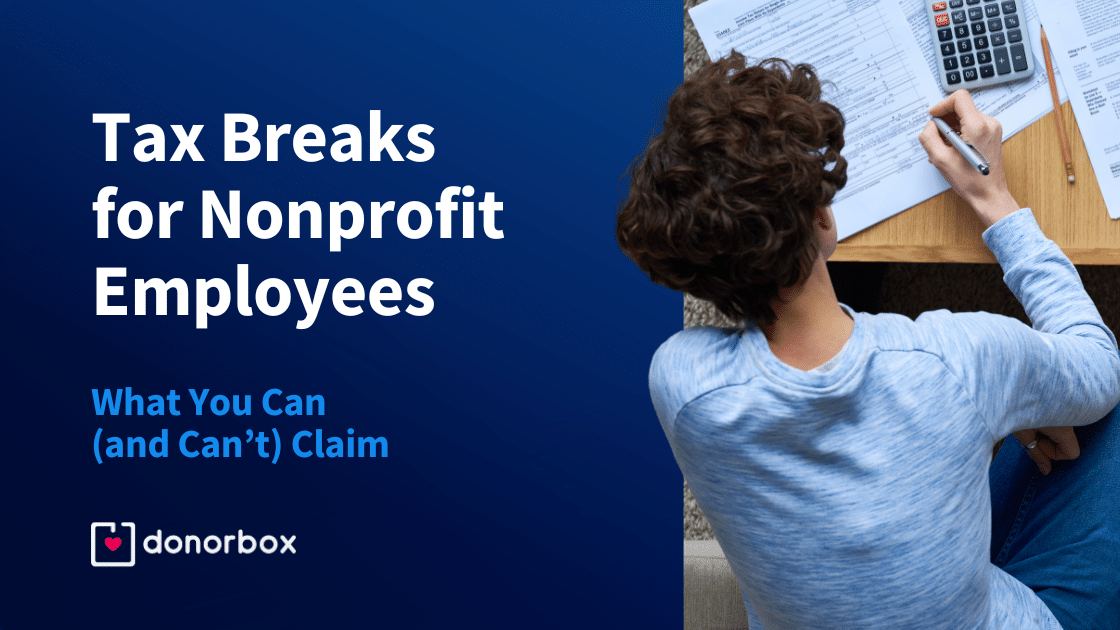Tax Breaks for Nonprofit Employees: What You Can (and Can’t) Claim
Is there a tax break for nonprofit employees? Discover which taxes you’re responsible for, what benefits you can take advantage of, and the IRS rules you need to know.

Is there a tax break for nonprofit employees? Discover which taxes you’re responsible for, what benefits you can take advantage of, and the IRS rules you need to know.

Despite what you might have heard, there’s no general tax break for nonprofit employees.
While nonprofits themselves may get tax breaks, employees generally still pay taxes, though a few roles, like pastors or clergy, have special exceptions.
In this post, we’ll explain why most nonprofit employees still pay federal income tax, highlight some tax benefits staff can access, and break down what nonprofit leaders and employers need to know about payroll obligations and compliance.
In short, no.
Nonprofits may qualify for tax-exempt status under IRS section 501(c)(3), but that exemption only applies to the organization’s charitable activities, not the paychecks of its employees.
Nonprofits are still responsible for payroll taxes like Social Security, Medicare, and federal and state unemployment taxes, and many must file tax returns to maintain tax-exempt status.
As for nonprofit employees, your wages, bonuses, and benefits are subject to federal income tax just as they would be in any other workplace.
That said, there are a few special exceptions for certain roles. For example, clergy members may have allowances or benefits that are treated differently for tax purposes.
But for most nonprofit employees, the rules are the same as in the for-profit world.

While nonprofit employees still pay federal income tax on their wages, there are some ways to enjoy tax-advantaged benefits through your employer.
You can’t avoid taxes entirely, but these benefits can lower your taxable income, and every little bit counts!
Here are some common nonprofit employee tax benefits:
In addition to these employer-provided benefits, nonprofit employees can also take advantage of personal tax deductions just like W‑2 employees in the for-profit world.
Some of the most common deductions for nonprofit employees include:
We’ve cleared up the myth that nonprofit employees don’t have to pay taxes, but another common question may come up: are nonprofits exempt from the Federal Unemployment Tax?
The Federal Unemployment Tax Act (FUTA) is a tax that helps fund unemployment benefits for workers. For most businesses, it’s 6% on the first $7,000 of each employee’s wages per year.
Generally, 501(c)(3) organizations are exempt from FUTA tax at the federal level. However, states can have their own unemployment tax rules, and some nonprofits may still be required to pay FUTA taxes.
If you’re a nonprofit employee, your nonprofit may not withhold FUTA from your paycheck, but you could still be covered by unemployment programs in your state.
Whether you’re running a nonprofit or working for one, it’s always a good idea to check your state’s compliance requirements.
As a nonprofit employee, you’re responsible for reporting the same types of taxes as those who work in for-profit businesses, usually by filing Form W-2 (provided by your nonprofit employer) with your personal tax return (Form 1040).
Here’s a list of the income tax requirements you may be responsible for as a nonprofit employee:
Working for a nonprofit is incredibly rewarding, but when it comes to taxes, nonprofit employees still play by the same rules as everyone else. Nonprofit leaders are responsible for withholding and paying payroll taxes on behalf of their staff.
Luckily, the right tools can make tax season, and every season, a lot easier.
Cue Donorbox! While we can’t file your payroll taxes, we can take the donor tax process off your hands – from automatically sending tax receipts to keeping donation records organized.
Sign up today to get started, and check out the rest of our Nonprofit Blog to learn more about tax and compliance.

Subscribe to our e-newsletter to receive the latest blogs, news, and more in your inbox.

